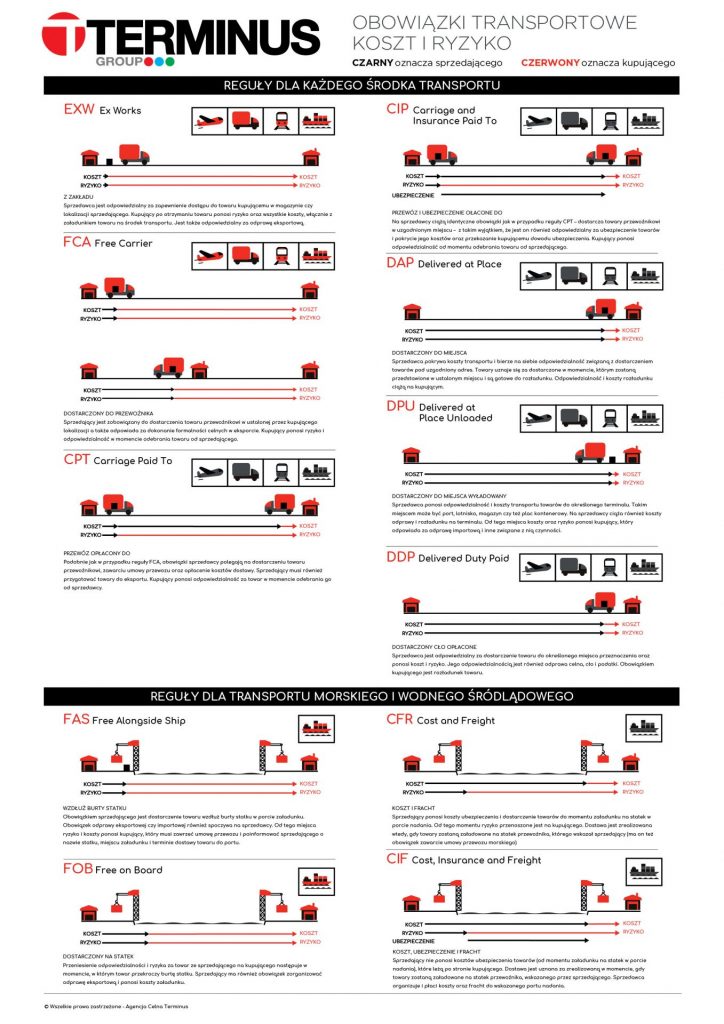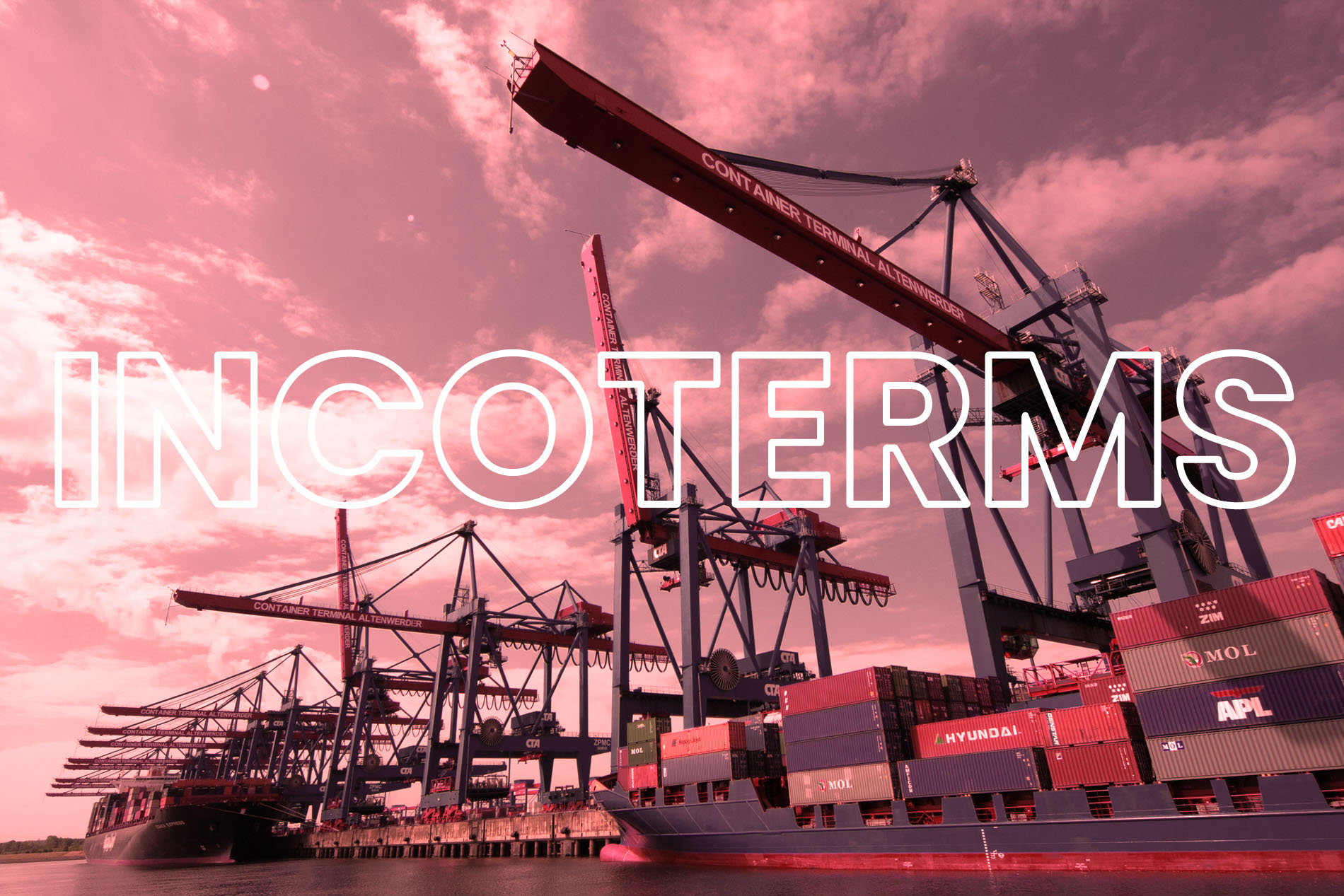What is INCOTERMS?
Incoterms (International Commercial Terms) is a set of regulations defining the terms of trade between the seller and the buyer. The latest version is Incoterms 2020. These terms have been incorporated into sales agreements worldwide and contain rules and guidelines for importers, exporters, lawyers, carriers, insurers, and students of international trade.
Trade terms help businesses avoid costly misunderstandings by clarifying the responsibilities, costs, and risks associated with delivering goods from sellers to buyers.
The International Chamber of Commerce (ICC) made the following changes in the 2020 version compared to the previous Incoterms 2010 version:
- The DAP rule was moved up a position, ahead of the previous DAT rule.
- The DAT (delivery at terminal) conditions were replaced by DPU (delivery at place unloaded). The rules remain the same, with only the name changed.
- The CIF rule was modified by introducing a new method to determine the applicable level of insurance coverage.
- The FCA rule was modified: Incoterms 2010 required the seller to provide the buyer with proof of delivery (transport document). Incoterms 2020 complements this by stating that when the buyer instructs the carrier to issue a transport document to the seller, confirming the goods have been loaded, the seller must provide the buyer with this document. Likewise, the buyer is required to give the carrier the above instructions if agreed by the parties.
Below are brief descriptions of the 11 rules from the Incoterms® 2020 edition.
INCOTERMS RULES
EXW (Ex Works)
The seller is responsible for making the goods available to the buyer at the seller’s warehouse or location. The buyer assumes all risks and costs, including loading the goods onto a transport vehicle. The buyer is also responsible for export clearance.
FCA (Free Carrier)
The seller is obligated to deliver the goods to the carrier at the location designated by the buyer and is responsible for completing the export formalities. The buyer assumes risk and responsibility upon receiving the goods from the seller.
CPT (Carriage Paid to)
Similar to the FCA rule, the seller’s responsibilities include delivering the goods to the carrier, concluding the transport contract, and paying for delivery costs. The seller must also prepare the goods for export. The buyer assumes responsibility for the goods when they are received from the seller.
CIP (Carriage and Insurance Paid to)
The seller has the same responsibilities as in the CPT rule – delivering the goods to the carrier at the agreed location. However, the seller is also responsible for insuring the goods, covering the cost, and providing proof of insurance to the buyer. The buyer assumes responsibility upon receiving the goods from the seller.
DAP (Delivered at Place)
The seller covers transportation costs and assumes responsibility for delivering the goods to the agreed address. The goods are considered delivered when they are presented at the specified location and ready for unloading. The buyer is responsible for unloading costs and risks.
DPU (Delivered at Place Unloaded)
The seller is responsible for the transportation and costs of delivering the goods to a specified terminal, which could be a port, airport, warehouse, or container yard. The seller also bears the costs of clearance and unloading at the terminal. From this point, the buyer assumes the costs and risks and is responsible for import clearance and related activities.
DDP (Delivered Duty Paid)
The seller is responsible for delivering the goods to the specified destination and bears all costs and risks. The seller is also responsible for customs clearance, duties, and taxes. The buyer is responsible for unloading the goods.
Download the infographic

INCOTERMS RULES FOR MARITIME AND INLAND WATERWAY TRANSPORT
FAS (Free Alongside Ship)
The seller is obligated to deliver the goods alongside the ship at the port of loading. The seller is also responsible for export or import clearance. From this point, the buyer assumes the risk and costs and must arrange the transport contract and notify the seller of the ship’s name, loading location, and delivery date.
FOB (Free on Board)
The transfer of responsibility and risk for the goods from the seller to the buyer occurs when the goods pass over the ship’s rail. The seller is also responsible for organizing export clearance and covering the loading costs.
CFR (Cost and Freight)
The seller bears the costs of insurance and delivery until the goods are loaded onto the ship at the port of departure. From this point, the risk is transferred to the buyer. Delivery is completed when the goods are loaded onto the carrier’s ship, as indicated by the seller (who is also responsible for concluding the maritime transport contract).
CIF (Cost, Insurance and Freight)
The seller is not responsible for the cost of insuring the goods (from the moment they are loaded onto the ship at the port of departure); this is the buyer’s responsibility. Delivery is considered completed when the goods are loaded onto the carrier’s ship, as indicated by the seller. The seller arranges and pays for the shipping and freight to the designated port of destination.
Download the infographic

